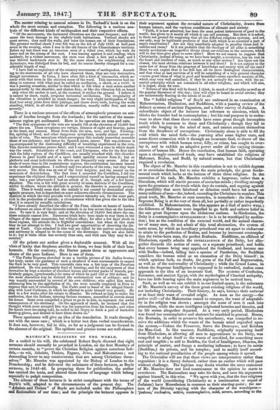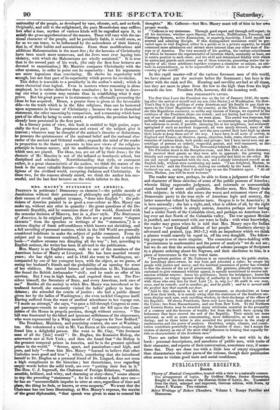MAURICE'S RELIGIONS Or THE WORLD.
By a codicil to his will, the celebrated Robert Boyle directed that eight sermons should annually be preached in London, on the first Mondays of certain months, to "prove the Christian Religion against notorious Infi- dels,---to wit, Atheists, Theists, Pagans, Jews, and Mahometans ; not descending lower to any controversies that are among Christians them- selves." Mr. Maurice was appointed by the Bishop of London to the Preachership ; and he delivered the substance of these lectures, as Boyle sermons, in 1845-46. In preparing them for publication, the author has omitted the texts, and altered those forma of language which belong especially to pulpit composition.
The scheme of these lectures is in strict compliance with the terms of Boyle's will, adapted to the circumstances of the present day. The "Atheists and Theists" of Boyle are included under the Philosophers and Rationalists of our time ; and the principle the lecturer opposes is
their argument against the revealed nature of Christianity, drawn from human nature, and the various conditions of climate and society. " Faith, it is now admitted, has been the most potent instrument of good to the world; has given to it nearly all which it can call precious. But then it is asked, is there not ground for supposing that all the different religions systems, and not one only, may be legitimate products of that faith which is so essential a part of man's constitution? Are not they manifestly adapted to peculiar times and lo calities and races ? Is it not probable that the theology of all alike is something merely accidental—an imperfect theory about our relations to the universe, which will in due time give place to some other ? Have we not reason to suppose that Christianity, instead of being, as we have been taught, a revelation, has its root in the heart and intellect of man, as much as any other system? Are there not the closest, the most obvious relations between it and them? Is it not subject to the same law of decay from the progress of knowledge and society with all the rest? Must we not expect that it too will lose all its mere theological characteristics, and that what at last survives of it will be something of a very general character —some great ideas of what is good and beautiful—some excellent maxims of life, which may very well assimilate, if they be not actually the same, with the es- sential principles which are contained in all other religions, and which will also, it is hoped, abide for ever. " Notions of this kind will be found, ; think, in much of the erudite as well as of the popular literature of this day; they, will often be heard in social circles; they are undoubtedly floating in the minds of ns all."
The " Infidel religions " of Boyle are embraced in an examination ot, Mahometanism, Hindooism, and Buddhism, with a paaaing review of the defunct systems of ancient Paganism' and a fuller survey of Judaism. A subordinate object of the lecturer has reference to missions, which he thinks the founder had in contemplation ; but his real purpose is to endea- vour to show that these three creeds have some great though incomplete truth which is common to them and Christianity ; though they fail to satisfy the longing in the mind of man, and cannot sustain themselves from the decadence of corruptions. Christianity alone is able to fill the void which the mind feels—the yearning after some higher state, and some direct connexion with it through an incarnate God, to throw off the, corruptions with which human error, folly, or crime, has sought to over- lay it, and to exhibit an adaptive power under all the varying circum- stances of human life. Hence the conclusion, that human faith, operating' upon a strongly-conceived truth, may have established the religions of Mahomet, Brahm, and Budd, by natural means, but that Christianity required a revelation.
The object of Mr. Maurice in this examination is not to exhibit dogmas or to scrutinize details, but to seize the main principle, the great funda- mental truth which lurks at the bottom of these three religions. In the- execution of his task, Mr. Maurice exhibits a largeness, rather than a liberalism, which will startle persons of sectarian minds ; dwelling strongly upon the greatness of the truth which they do contain, and arguing against the possibility that mere falsehood or delusion could have led astray so manymill' ions of men—far, indeed, exceeding the Christiana in number. This great truth, Mr. Maurice at once concedes, is monotheic : the idea of one Supreme Being is at the root of them all, but partially or rather imperfectly exhibited. In Mahometanism, the idea appears as a God of active wuj.;: the followers of Mahomet were impelled to go forth and enforce belief in. the one great Supreme upon the idolatrous nations. In Hindooism, the Deity is a contemplative INTELLIGENCE: he is to be worshiped by medita- tion; but as the condition of the external world, and the animal charac- ter of many men, do not admit of this total abstraction, the system of caste arose, by which an hereditary priesthood was set apart to endeavour, to attain to the perfection of Brehm, and become by incessant contempla- tion the twice-born man, the perfect ,Brahmin. Buddhism, an offshoot of Hindooism, equally. admits the INTELLIGENCE of the Deity, but alto-: gether discards the notion of caste, or a separate priesthood, and holds. that every human being may apprehend the Godhead, and become one with Budha—indeed, falling into a species of Pantheism, the Buddhist considers the human mind as an emanation of the Deity himself: in which opinions lurk, no doubt, the germ of the Fall and Regeneration,. as well as of the universality of Christianity ; while the Grand Lama; in whom the Supreme Intelligence is supposed to be embodied, makes some approach to the idea of an incarnate God. The systems of Confucius, Zoroaster, and ancient Egypt, with the mythologies of Classical antiquity, have too little bearing upon the main argument to be noticed here.
Such, as well as we can exhibit it in our limited space, is the substance of Mr. Maurice's survey of the three great existing religions of the world, not including Christianity. Their history, he says, betrays their natural or at least their want of revealed origin. As soon as the energy—the active will—of the Mahometan ceased to conquer, the want of adaptabil- ity in the religion was shown ; amongst the mass of men it sank into- sensualism, while the more intelligent originated heresies and theories, and its life seems altogether departed. At a very early period, Hindooism was found too contemplative and abstract for mankind in general. Hence, the Brahmin, in order to preserve his ascendancy, was compelled to re- ceive the additions which the wants of the human mind engrafted upon the system,—Vishnu the Preserver Seeva the Destroyer, and Krishna the Man-God. In like manner, Buddhism, originally separating itself from Hindooism, as allowing all men to approximate to the Deity, was compelled to adapt itself to the wants of mankind, for something more real and tangible ; to add to Buddha, the God of Intelligence Dharma, the principle of matter, and Sanga a mediating influence; to Wave its saints (Buddhas,) its priests, and its temples ; and to modify itself accord- ing to the national peculiarities of the people among whom it spread.
The Orientalist will see that these views are interpretation rather than exposition : it is a theory deduced, rather than an outline which will pass without challenge. The logician may doubt whether the mere statement of Mr. Maurice does not lend countenance to the opinion he starts to overthrow. The Rationalists may take his facts, and turn his arguments against himself, in this wise. "We agree with you, that the four religions of the world (considering Christianity as a continuation or sequel of
Judaism) have Monotheism in common as their starting-point ; the na- ture of the Divinity varying with the character of the worshipers— 'jealous,' exclusive, active, contemplative, mild, severe, according to the
nationality of the people, as developed by race, climate, soil, and so forth. Originally, and still to the enlightened, the pare Monotheism may suffice; but after a time, mythes of various kinds will be engrafted upon it, to satisfy the gross apprehensions of the masses. These will vary with the na- tional character of the people, and be peculiarly liable, it would seem, so far as we can trace, to be influenced by the antecedents of their history, that is, of their habits and associations. From these modifications and additions Mahometanism is the most free ; for the heresies of Christianity have been much more numerous, and the Jews were ever lapsing into idolatry, with whieh the Mabometans are wholly untainted." It is true that in the second part of his work, (for only the first four lectures are devoted to examination,) Mr. Maurice compares Christianity with the other systems, in order to point out its superiority : but his arguments are more ingenious than convincing. He shows its superiority well onough, but not that part of its superiority which proves its revelation. This defect is traceable to a peculiarity in the author's mind; which is more rhetorical than logical. Even in matters where reasoning is alone employed, he is rather deductive than conclusive ; he is better in draw- ing out what a system may contain than in establishing what it may prove. But his great power is in statement—in effectually presenting the ideas he has acquired. Hence, a greater force is given to the favourable side—to the truth which is in the false religions, than can be bestowed upon arguments in favour of Christianity ; because the one is rhetorical statement, the other reasoningby comparison, and a reasoning which loses part of its effect by being to some extent a repetition, the premises having already been presented in the first part. In a literary point of view, this book is entitled to high praise, espe- cially the first part. The greatness and extent of the subject give it interest ; whatever may be thought of the author's theories or deductions, he presents the quintessence of the national belief and the national cha- racter of the ancient and Oriental worlds; expands the mind of the reader in proportion to the theme ; presents to him new views of the religious principle in human nature, and its modification by the circumstances in which men are placed. The ideas, too, are set off by their dress ; for the rhetoric of Mr. Maurice is not of the inflated or bombastic school, but disciplined and scholarly. Notwithstanding that style, or statement rather, is a great characteristic of the author, we think the matter of the book is the most valuable feature—the interpretation of the various re- ligions of the civilized world, excepting Judaism and Christianity. In these two, for the reasons already stated, we think the author less suc- cessful, and the last four lectures on the whole inferior to the first.



























 Previous page
Previous page